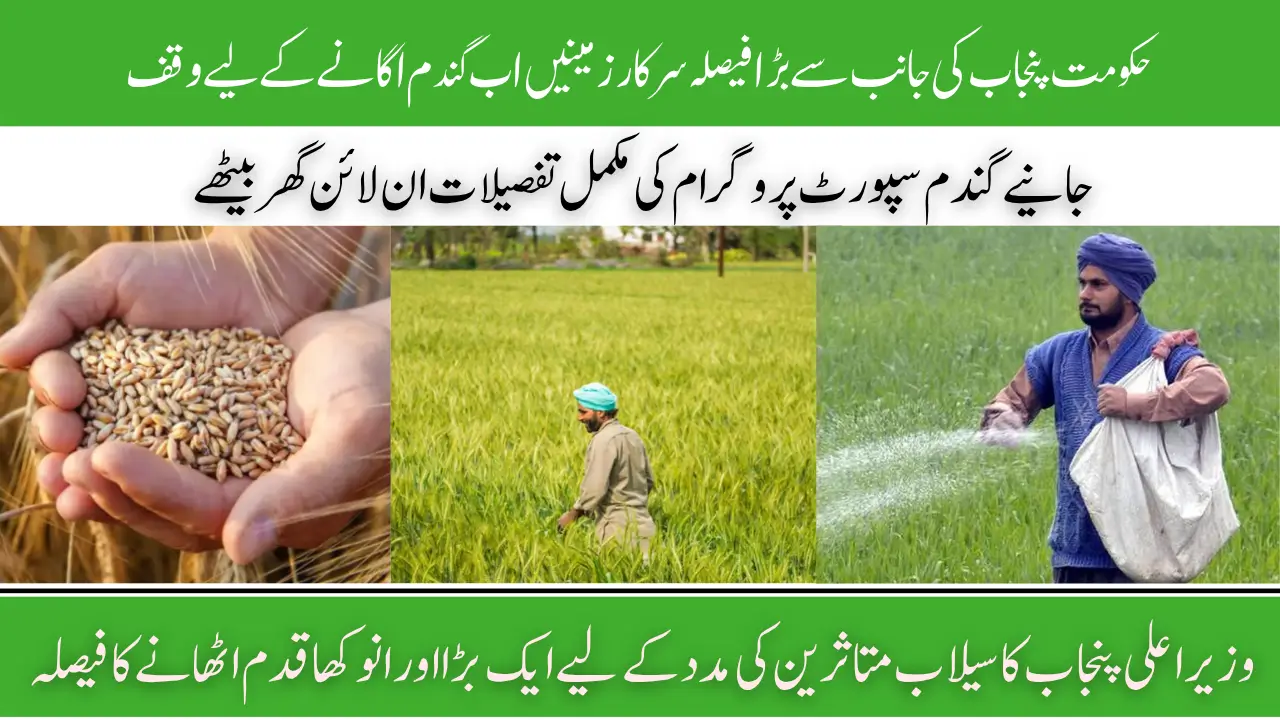Introduction Punjab Chief Minister Directs Wheat Farming
Punjab Directs Wheat Farming; In a significant move to strengthen Punjab’s agricultural and developmental landscape, the Chief Minister has directed the cultivation of wheat on all available government agricultural land using high-quality seeds. This directive reflects the government’s renewed focus on enhancing food security, improving productivity, and making effective use of public resources.

The initiative marks an important step in Punjab’s broader agricultural strategy, aligning with the province’s commitment to sustainable growth and self-sufficiency. By integrating modern governance practices, transparent data collection, and environmentally conscious projects such as the electrobus system and flood preparedness programs, the Punjab government aims to foster a resilient and progressive rural economy. This comprehensive approach underlines the leadership’s vision for a modern, green, and prosperous Punjab.
Key Highlights of the CM’s Directive
Punjab Chief Minister Maryam Nawaz announced key measures to boost development, strengthen agriculture, and enhance governance across the province. The directive focuses on transparency, sustainability, and improved public welfare.
- Wheat to be grown on all government farmland.
- High-quality seeds to boost crop yields.
- Electrobus project to expand eco-friendly transport.
- Transparent flood surveys for better preparedness.
- Action to curb stray dog bites and improve road safety.
- Maintenance of 5,000 water filtration plants.
- Strict enforcement of official bread prices.
- Tribute paid to teachers for their vital role.
The directive aims to build a modern, safe, and sustainable Punjab.
Background: The Need for Increased Wheat Production
Punjab faces growing pressure to boost wheat output as demand rises and climate challenges affect yields. The Chief Minister’s directive focuses on using government farmland efficiently to strengthen food security and support local farmers through modern, sustainable methods.
- Wheat is Punjab’s main food and cash crop.
- Demand for wheat is increasing every year.
- Climate change and high costs reduce yields.
- Government land will be used for wheat farming.
- High-quality seeds will improve production.
- The goal is to reduce imports and ensure food stability.
Punjab aims to boost wheat output for long-term food security and farmer support.
Scope of Implementation
The Punjab government has outlined a clear plan to implement the Chief Minister’s directive on wheat cultivation across the province. The initiative focuses on efficient land use, modern farming practices, and close monitoring to achieve maximum results.
- All government-owned agricultural land will be cultivated with wheat.
- The Agriculture Department will oversee the entire implementation process.
- High-quality certified seeds will be distributed to ensure better yields.
- Modern irrigation and farming techniques will be applied for higher efficiency.
- District administrations will monitor progress through regular field reports.
- Transparent data collection will track production and ensure accountability.
Punjab will implement the wheat cultivation plan through coordinated efforts and strict monitoring for maximum productivity.
Government’s Implementation Plan
The Punjab government has developed a structured plan to ensure the successful execution of the Chief Minister’s wheat cultivation directive. The strategy emphasizes efficient resource use, coordination among departments, and transparent monitoring to achieve high productivity.
- The Agriculture Department will lead the implementation at the provincial level.
- District administrations will identify and prepare all government farmland for cultivation.
- High-yield wheat seeds will be provided to ensure better crop output.
- Modern machinery and irrigation methods will support efficient farming
- Regular field inspections will ensure progress and resolve issues promptly.
- Data-driven monitoring will help track results and improve future planning.
The government’s plan ensures organized, transparent, and result-oriented wheat cultivation across Punjab.
You Can Also Read: Mear Ghar Mera Ashiyan Scheme Registration Process with SBP, Check Eligibility Criteria
Expected Benefits
The Chief Minister’s wheat cultivation initiative is set to bring major improvements to Punjab’s agriculture and economy. By using government land effectively and promoting modern farming, the program aims to secure food supplies and uplift rural livelihoods.
- Increased wheat production to meet rising food demand.
- Stronger food security and reduced reliance on imports.
- Better use of government-owned agricultural land.
- Higher income opportunities for local farmers and workers.
- Promotion of sustainable and modern farming practices.
- Boost to the overall agricultural economy of Punjab.
The initiative will strengthen Punjab’s food security and boost its agricultural growth.
You Can Also Read: 12th Class Supplementary Exam 2025 Date Finally Revealed, Don’t Miss It
Expert Opinions and Public Reactions
The Punjab Chief Minister’s wheat cultivation directive has received widespread attention from both agricultural experts and the public. Experts have praised the move as a timely step toward ensuring food security and promoting sustainable farming, while citizens see it as a positive effort to utilize government land efficiently.
- Agricultural experts call it a strategic step for long-term food stability.
- Economists expect reduced wheat imports and better resource management.
- Farmers welcome government support for seeds and land use.
- Environmentalists appreciate the focus on sustainable cultivation.
- Citizens view the plan as a boost for local food availability and employment.
- Some experts stress the need for transparent monitoring and fair distribution.
Experts and citizens alike see the plan as a smart move to strengthen Punjab’s agriculture and food security.
You Can Also Read: Suzuki Car on Easy Installments with 0% Interest via MCB Bank, Eligibility, Documents, and Monthly Cost
Frequently Asked Questions
What is the purpose of Punjab’s new wheat cultivation initiative?
The main goal is to boost wheat production by making full use of unused government-owned agricultural land.
Who is responsible for managing the wheat cultivation project?
The Punjab Agriculture Department, along with district administrations, will supervise and coordinate all implementation activities.
When will the government begin the wheat cultivation process?
The preparation and groundwork will start ahead of the upcoming Rabi sowing season.
How will this project benefit private farmers and local communities?
Local farmers may receive opportunities for seed supply, labor contracts, and employment, supporting rural livelihoods.
In what ways will the initiative strengthen Punjab’s economy?
It will enhance food security, lower dependency on wheat imports, and create more agricultural and rural job opportunities.
You Can Also Read: Lahore Board 11th Class Result 2025, Check Online Now
Conclusion
The Punjab Chief Minister’s directive on wheat cultivation represents a bold and strategic move toward agricultural self-sufficiency. By focusing on the effective use of government-owned land, introducing high-quality seeds, and promoting modern farming techniques, the initiative directly addresses key challenges such as food insecurity, low yields, and inefficient land use. It also highlights the government’s dedication to supporting farmers, enhancing productivity, and ensuring that every inch of cultivable land contributes to the province’s growth.
Moreover, the plan goes beyond short-term gains it lays the foundation for a sustainable agricultural model that strengthens Punjab’s economy and supports rural communities. With transparent monitoring, strong coordination between departments, and consistent follow-up, this initiative can significantly improve food stability and farmer livelihoods. It embodies the vision of a modern, green, and self-reliant Punjab.
You Can Also Read: Wazirabad Electric Bus Route Map, Eco-Friendly Transportation









